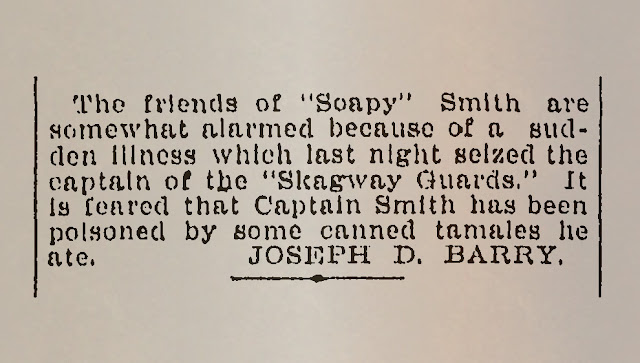id Soapy Smith operate in San Diego, California, in 1886?
I occasionally find newspaper accounts in which I wonder if the unidentified bunco man isn’t “Soapy” Smith. There were a few other confidence men that operated the prize package soap racket around the country so the odds are often pretty slim that it is Soapy. However, in this case there is enough circumstantial evidence pointing to a definite "maybe." The newspaper clipping shown at the top is from the San Diego Union, March 20, 1886, and is transcribed below.
—The “soap racket” was being successfully worked on the corner of Fifth and F streets yesterday, by a follower of the circus. Several suckers bit furiously. A prominent real estate man is said to have also contributed about $12 toward paying the “fakir’s” expenses northward.
Of interest to note is that $12 in 1886, is the equivalent of about $404.56 in 2023 dollars. Nice payoff, and that was from just one customer.
Before calling Denver "home," Soapy was a nomad traveling around the western states and territories. There were occasions after he resided in Denver in which he went on the road once again. My
research does indicate Soapy was
not in Denver at the time of the San Diego incident, meaning that he was on the road and likely operating his cons. Thus, it's possible that it is Soapy. As there is only circumstantial evidence but no provenance, this article will be filed as a
“maybe,” and left for future evidence to ascertain in the positive or negative.
(Click image to enlarge)
Soapy’s wedding to Mary Eva Noonan took place on February 1, 1886. Did the couple go on a trip, perhaps to California? Did Soapy possibly take her to that circus?
Two letters from Mary in March 1886 are addressed to Soapy at 1711 Larimer Street, Denver. Soapy had his mail delivered to a local cigar manufacturer merchant to keep his residence a secret. Mary was not in Denver at the time, so could have Soapy gone on the road to work?
On March 13, 1886, the Rocky Mountain News reported the following activity.
The Thieves Must Go
Ten or twelve tin horn gamblers, holdup [men,] and all around thieves have received official notification from the police to leave the city, and several have already complied with the modest request, [—] others have asked and have been granted an extension of time in which to get their traps together. The police are determined to rid the town of suspicious characters. Besides those served with notices, there are a number of others on the list, and they will be notified within a day or two to make themselves scarce. There will be no favor shown to anybody who belongs to the non-producing class. Every man in town who has no visible means of support will receive a notification, if he hasn’t sense enough to leave without one.
It is possible that Soapy left Denver for a spell, just long enough for the threats to cease. Not certain is whether the police asked Soapy to leave or whether he did so on his own, but between March and December, Soapy's name does not appear in Denver newspapers. Several bunco arrests occurred during this period, but Soapy is not mentioned.
Letters to Soapy at the end of December 1886 indicate he was in Chicago. A February 13, 1887, letter to Soapy shows he had been in St. Louis with his wife and children during Christmas. He did not, however, stay away from Denver for long. Letters to Jeff began arriving in Denver in November 1886, addressed to 1711 Larimer Street. Jeff also began receiving letters from old friends and associates.
As the timing of Soapy's absence from Denver coincides with the San Diego time-line, It is very possible that Soapy Smith operated his prize package soap racket in San Diego, California in 1886.
(Click image to enlarge)
ADDENDUM
The following was added April 2, 2023
Eight days later, on March 28, 1886, the San Diego Union published that the soap fakir (Soapy Smith?) was at it again.
—The soap fakir spread his "lay-out" for a while yesterday, and caught his usual amount of custom [customers].
 |
| The soap fakir San Diego Union March 28, 1886 |
(Click image to enlarge)
"All men that bet should not be classed as gamblers, for some things that style themselves men will bet (to win, of course), and kick if they lose, which a gambler will never do, although he may sometimes be sucker enough to bet (to win) against a sure thing, like old monte or a brace game. A kicker, or squealer, always speaks of the money he has lost, against any game, as his money; while the gambler considers the money he loses, against any game, as lost: and it belongs to the person who won it, and you never hear one of them do any kicking."
—George Devol























